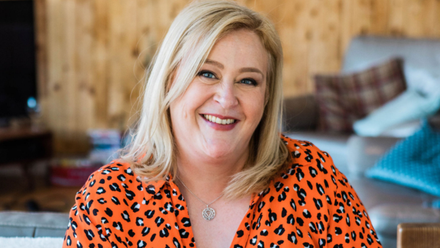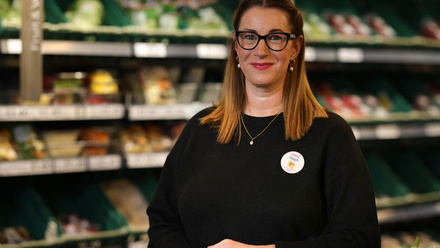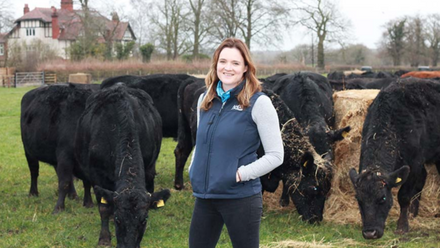Building your resilience toolkit to prevent burnout
Burnout – we’ve all heard of it. But what does the phrase actually mean, and how do we know the difference between a healthy amount of pressure versus an unmanageable amount of stress? And what do we do about it if we think we’re suffering from burnout?
Amy Wilkinson, Food and Grocery Industry Coach and co-host of award winning podcast “Oh for Food’s Sake” hosted a masterclass recently which helped to answer all of our burning questions about burnout (excuse the pun), and gave us some great tips on how to build and maintain our resilience.
She gives us some more detailed insights on some of the questions asked in the masterclass…
I sometimes struggle to ask for help when I’m heading for burnout because I don’t want to look to look useless. What advice would you give someone in that position?
It’s normal to struggle to ask for help, because as humans we are hard wired not to look what we perceive as ‘weak’ in front of others. But know it’s normal to sometimes reach your limits and that we all get to a point where our stress bucket is full. Ask yourself – how does it make you feel when people ask for help? Usually it actually makes the other person feel good. Studies by researcher Brene Brown actually found that the number one behaviour that elicited trust for leaders in their team was when they were brave enough to ask for help.
Can we ever manage the balance between working full time and being a mum?
It’s hard – don’t let anyone tell you otherwise but here are some things you can do to help find some balance:
- Prioritise self care or things that are just for you, this will make you a better mum when you are with your kids
- Delegate at home as well as work – create systems and clear responsibilities, what’s the things ONLY you can do (e.g. watch the play they’re in)? What can you delegate (making packed lunches)?
- Be tight on boundaries – make sure your mother energy isn’t spilling into work and you’re not putting everyone’s needs at work ahead of your own too
- Self compassion – let go of the mum guilt, reframe this around being a role model for your children
- Communicate your needs – to family, to colleagues, to the kids themselves (another great modelling exercise)
What about others around us – how can we best support others when we spot the signs of burnout?
It’s important to create an open environment to talk and ask open ended questions like “how are you feeling?” and really listen to their responses, be that supportive ear.
You can offer observations but don’t be judgemental (use empathy & active listening). If it’s appropriate, share resources with them like my resilience download. And one of the most important things in an organisation is to lead by example. When teams see leaders putting healthy boundaries in place for work life balance this really sets a precedent for a positive and inclusive company culture.
What advice would you give to new younger employees who struggle multi-tasking in a high pressure environment?
Prioritisation can be hard when you’re starting out, so I’d say asking for help to better understand the importance / urgency of tasks is a good start. Don’t be afraid to ask questions – it’s better than suffering in silence!
When overwhelmed, break down tasks into bite sized pieces and focus on one thing at a time. Time management techniques are also useful (avoiding distractions, time blocking etc)
Finally, find a mentor that you can lean on and ask the “stupid” questions in a safe space without fear of judgement. Meat Business Women has a mentoring scheme so this is a great tool to match yourself with a mentor.
What are the best tools to reach a large number of staff with different needs?
In the first instance, you need to identify the needs. So use surveys and assessment to help identify what the areas of focus need to be. And then think about:-
- Educational hub with videos re resilience etc
- Access to counselling / coaching / creating a culture where people are safe to talk
- Workshops and speakers
- Peer support networks / listening groups
How do you know if you already have burnout? What are the symptoms to be looking out for?
If you’re questioning it, you may well have already answered your own question. There is no diagnostic / blood test for this, so here’s some of the signs to look for:
- Physical symptoms – headaches, migraines, pain
- Emotional – cynicism, irritability
- Cognitive – brain fog
- Behavioural – drinking to excess, eating to excess etc
- Interpersonal – strained relationships
It’s important to note that burnout can manifest differently for each individual, and not all symptoms may be present. ALWAYS check with a doctor that there isn’t something else going on, which this is a symptom of. However, if you notice a combination of these signs persisting over an extended period, it may indicate that you are experiencing burnout.
Do you have any advice around how to start an open conversations with your boss if you feel like you’re burnt out?
- Prepare for the conversation – what do you want to get out of it? Gather examples
- Get them at a time when they’re likely to be more receptive, do it privately
- Describe your symptoms, as facts, without blame
- Say you want to collaborate but have some ideas of what might help
- Ask for support and for a follow up meeting to review
Become a member of Meat Business Women to watch the masterclass back on demand here






